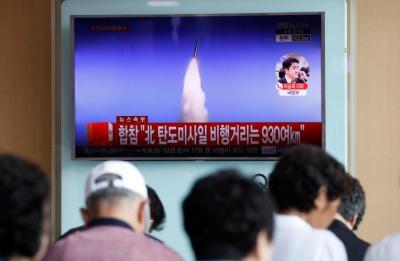Be Anxious for Nothing Includes Defiant North Korea

On Aug. 8, 2017, I was in my office at Moody Bible Institute, calmly preparing syllabi for the upcoming fall semester when I got a notification on my iPhone: North Korea now has nuclear warheads capable of fitting inside its intercontinental ballistic missiles.
The news disturbed me because the long-standing tensions over North Korea's nuclear program suddenly took a nosedive into the depths of the dark, tense, and anxious ocean of international relations. As I continued to work on my class syllabi, I forced myself to keep at a safe mental distance the thoughts of ballistic missiles, nuclear warheads, and defiant North Korea.
A few hours later, I received another notification: Trump threatens North Korea, "will be met with fire and fury like the world has never seen." Images of unprecedented fire and fury took my mind to an uncomfortable place. I could feel the icy waves of anxiety and worry trying to reach the shoreline of my emotions. I determined that I was not going to wade in those waters.
Some of my readers may be thinking, "Neely, your problem is your iPhone. Put it on mute." Fair enough, but that's a discussion for another article.
That evening, I watched the Situation Room with Wolf Blitzer. He interviewed a U.S. senator on the Senate intelligence committee about the escalating tensions between the U.S. and North Korea. Blitzer asked him, "How many nuclear weapons does North Korea have – 40, 60?" The senator responded, "I can't answer that Wolfe; it is obviously classified." Then right before commercial break, Blitzer observed, "This is an ominous situation for the United States and its allies."
This ominous news has flooded the collective American mental landscape for the last week. As the tensions continue to rise, national worries continue to rise as well. The increase of worry and anxiety prompted one American General to encourage Americans with these words: "Americans can go to sleep at night." In other words, Americans need not worry about North Korea.
As Christians we are commanded, "Be anxious for nothing (Phil. 4:6)," — and that includes a defiant North Korea. But the command not to worry is not a call to indifference nor an excuse for apathy. While we should not worry about the escalating tensions between our respective countries, it is our Christian responsibility to be concerned about these escalating tensions. Concern is appropriate because concern and worry are not synonymous. Worry is rooted in unbelief, pride, and practical atheism, whereas concern is rooted in confidence in the Lord, and is an expression of healthy Christian living.
Here then is the practical question: How should Christians express concern in the situation between the U.S. and North Korea?
First, we should make this matter a prayer concern before the Lord (1 Tim. 2:1-6). We intercede on behalf of the political leaders involved such as our president Donald Trump and Kim Jong Un, North Korea's 33-year-old leader. We ask the Lord to grant these leaders and their advisors the wisdom to be peacemakers (Matt. 5:9), asking the Lord for a peaceful outcome instead of war. Of course, we pray for the progress of the gospel in North Korea and for the strength of the persecuted church there and for Christ followers who are in prison camps for the cause of Christ.
Second, we educate ourselves. We talk with our congresspersons or senators to ascertain what steps our government is taking to insure national security and regional stability. In some cases, a local church may delegate this responsibility to the pastor or to a member of the church staff, or to a mature man or women in the congregation. Churches should come together, pray, discuss, and share information that will keep the body of Christ informed about these matters.
Third, be in fellowship and conversation with our American Korean brothers and sisters in Christ. Some of them have relatives and friends who live on the Korean peninsula. It is wise to listen to them, gain their perspective on the issue, and pray with them as brothers and sisters.
I am glad our government encourages us to sleep at night, but that does not mean that the church should be indifferent. We should not worry about anything, but as Christ followers we should be concerned, expressing our biblical and earnest concern in creative, informed, and wise ways.





















